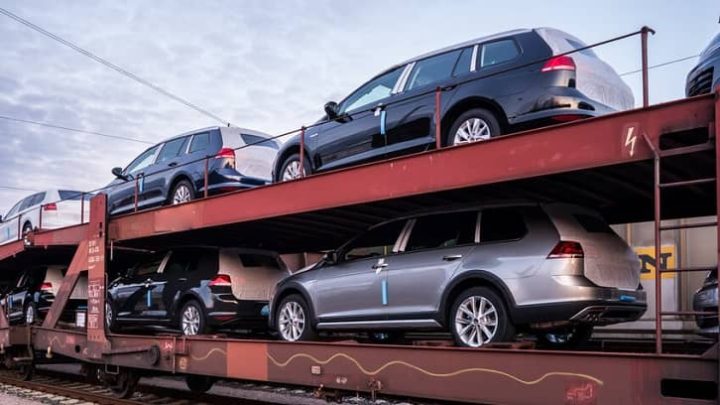Nigeria’s recent efforts to stabilize the naira appear to be gaining traction, with a notable surge in vehicle imports underscoring renewed business confidence. Over just two days, 1,350 fully assembled units arrived at the Port of Tin Can Island’s Motorpark Logistics terminal (PTML), signaling an uptick in economic activity anchored on currency steadiness.
Industry insiders describe the bulk importation as a powerful statement: importers are moving forward with significant orders, suggesting they have regained faith in the naira’s resilience after a period of volatile fluctuations. For months, uncertainty surrounding the foreign exchange environment had sapped private sector appetite for large-scale imports, particularly when exchange rates were unpredictable.

The recent inflow of vehicles lends credibility to the Central Bank of Nigeria’s (CBN) efforts to ease ongoing forex challenges. Since authorities introduced revamped exchange rate policies, including the unification of forex windows and improvements in market transparency, rate stability has improved markedly. Though still under pressure, the naira has regained ground, calming fears that blatant volatility would persist.
Importers of vehicles often operate on thin margin assumptions. Sharp naira depreciation can distort profitability overnight, deterring them from making large purchases until exchange rates stabilize. In this context, the arrival of more than a thousand cars in a short space of time suggests both operational courage and early signs of shipping market normalization.
Among the vehicles landed at PTML were a mix of new passenger cars—comprising entry-level, mid-sized, and luxury models—as well as utility pickups and two types of SUVs. Though importers did not disclose brand names, it is likely these shipments cater to popular domestic segments: affordable sedans for everyday consumers and light commercial pickups for small business operations across urban and peri-urban communities.
The decision to dock at PTML, a deepwater terminal with modern facilities, also highlights a logistical pivot. While Apapa remains the country’s primary port, congestion and port handling inefficiencies have pushed many importers to switch to alternative terminals. PTML offers space, digital tracking systems, and improved cargo turnaround—assets attractive to importers managing time-sensitive stock through busy supply chains.
Commercial and trade analysts emphasise the symbolic value of these shipments. It signals that importers expect the naira to hold around current levels, justifying forward FX bookings and making large orders commercially viable. It also suggests that licensed foreign exchange platforms and banks are performing reliably, enabling traders to access dollars with minimal delay.
On the demand side, the presence of these vehicles in market channels may serve consumer expectations. After months of uncertainty, car dealers and dealerships often held reduced inventory. The arrival of new stock may help replenish options for buyers and could drive down prices in both official and parallel markets due to increased supply.
Dealerships in major cities have reported upticks in inquiries and bookings following the announcement of fresh stock arrivals. Though some buyers remain cautious—seeking confirmation of price stability and assurance of warranty services—traders express cautious optimism that a predictable currency outlook will spark demand resurgence.
Despite the encouraging signs, observers note that systemic Forex challenges still remain. The parallel market rate continues to trade at a premium, reflective of occasional tight supply or speculative demand pressure. Authorities have pledged to sustain currency stability through ongoing interventions and market reforms, aiming to align the official and parallel exchange rates closely.
Meanwhile, the Nigerian Automotive Dealers Association has urged the CBN and the Federal Ministry of Finance to support the sector through calibrated import policy and stronger coordination with Customs. They argue that timely FX availability and streamlined clearance procedures are essential to avoid bottlenecks as more cargo reaches alternative terminals like PTML.
Financial experts believe the PTML shipments may presage a broader return to import-led business cycles. Alongside vehicles, they anticipate growth in electronics, building materials, and industrial machinery imports—areas that often dulled during periods of currency uncertainty. Assuming the naira remains stable and FX liquidity continues, these sectors could benefit from improved supply, stimulating activity across manufacturing and construction.
On the flip side, some environmental and road safety advocates caution against a rapid rise in vehicle numbers. Poorly regulated fleets and undertrained drivers pose risks. They call for synchronized policy measures to ensure safe importation standards, importer accountability, and adherence to vehicle type approval and emission norms.
Nonetheless, the current deliveries offer a hopeful economic story. Inbound shipments of 1,350 vehicles into PTML within 48 hours may not, on their own, resolve broader macroeconomic challenges—but they provide a bellwether. They signal that business actors feel emboldened enough to resume large orders, potentially reinvigorating commerce across automotive distribution, logistics, and related services.
For end consumers, more cars in market channels could translate to better price bargains, broader choice, and shorter delivery timelines. For policymakers, it underscores the urgency of maintaining currency stability and ensuring supply chain efficiencies.
As PTML continues to receive additional consignment flows, stakeholders are watching keenly. If similar volumes persist and national FX conditions remain stable, Nigeria’s automotive sector may be on the cusp of a revival—another step in the wider journey toward restored investor confidence and economic momentum.
Support InfoStride News' Credible Journalism: Only credible journalism can guarantee a fair, accountable and transparent society, including democracy and government. It involves a lot of efforts and money. We need your support. Click here to Donate
